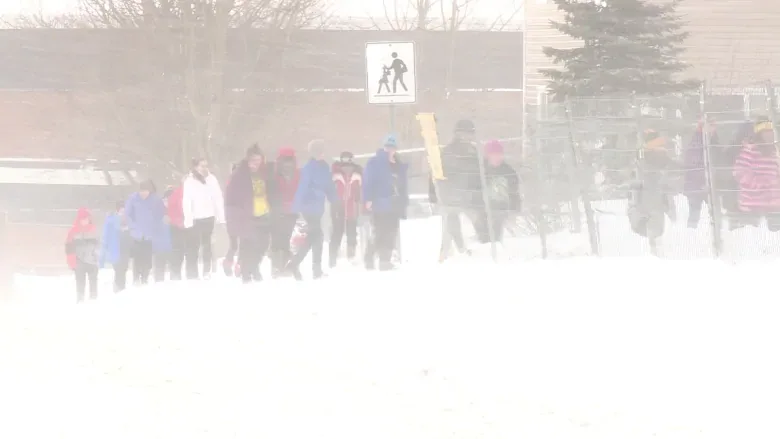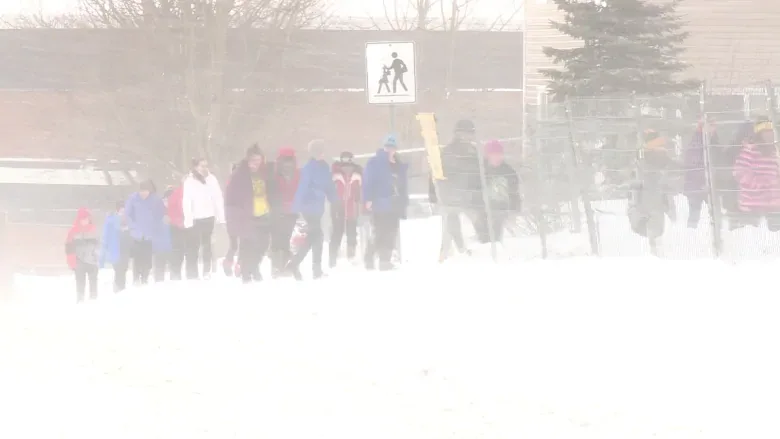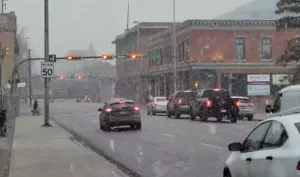
No plans to extend school year despite 10 snow days in St. John's area

Students walk out of school to catch a bus on a stormy winter day in St. John's. (CBC)
Schools in the St. John's metro area have seen snow days soar this year — with more than a week of them during mid-January's monster blizzard — but the district says there are no plans to extend the school year.
A little over 300 centimetres of snow has graced the St. John's metro area this winter, wreaking havoc on school curriculums.
Darryl Feener, the Newfoundland and Labrador English School District's assistant director of education and programs in the Avalon region, said high schools in the area have missed 9½ days of instruction this winter, while K-9 schools have missed 10½ days.
SEE: 335 cm and counting. Has Newfoundland stolen Canada's winter snow?
"That's been a big increase for the metro region. We're used to having a lot fewer days. Last year, by way of example, we lost one and a half days," Feener told CBC Radio's St. John's Morning Show.
"Leading into Christmas it was pretty quiet, but since Christmas Eve it's been relentless."
Feener said school principals will be focusing on classroom time, possibly delaying planned field trips, guest speakers and similar events that can eat up hours teachers are trying gain back before June.
As for cancelling professional development days — five days set aside each school year as part of the collective bargaining agreement for teachers to develop skills as well as prepare report cards — Feener said there's no flexibility there.

Darryl Feener, Newfoundland and Labrador English School District's assistant director of education and programs for the Avalon region, says the school year will not be extended to make up for lost time during snow days. (Paula Gale/CBC)
Memorial University has opted to extend its winter semester to make up for lost time. Feener said that won't be the case for the province's grade schools. Other areas of the province often experience 10-15 days of missed school regularly, he added.
"Around Newfoundland and Labrador there are times where we've become accustomed to losing these number of days," said Feener.
"We're confident that we can ensure that the learning still continues in our schools and we're able to meet the outcomes."
'I'VE NEVER BEEN INVOLVED IN A BLIZZARD OF THIS MAGNITUDE'
MAKING THE CALL
The NLESD puts a lot more into calling a school day than simply looking at a weather forecast the night before, he said.
Feener said when severe weather is expected on the Avalon Peninsula, a team of six — from the district's areas of programs, operations, facilities and communications — hold a conference call to discuss a plan as early as 4:30 a.m.
The day's weather is broken down hour by hour, looking at snowfall, wind speeds and visibility.
From there a decision is generally made by 6 a.m. on whether to open, close or delay schools.
"We try to make those decisions early, try to provide families with as much time to communicate as possible," Feener said.
"We have a high degree of confidence that our teachers will use the remaining instructional time to really focus on those key areas that they need to."
WATCH: WILL THE ACTIVE PATTERN CONTINUE INTO SPRING?
This article was originally published by CBC with files from The St. John's Morning Show









